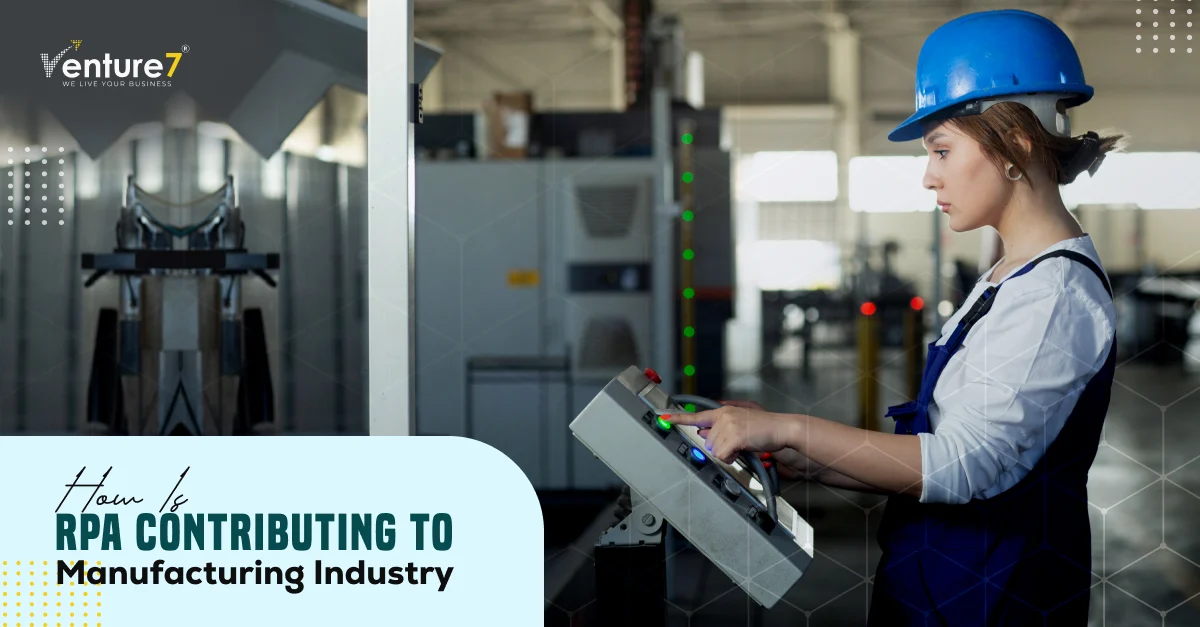The manufacturing industry involves both front and back-end processes that need to be balanced as per the new regulations and situations. This industry needs constant innovation and seamless communication to carry out the process in an efficient manner. This industry is rapidly shifting towards the use of advanced technologies to carry out the process seamlessly by reducing complexities.
The infusion of RPA in the manufacturing industry has helped companies to streamline the manufacturing process by automating various operations and provide exceptional services to the customers. RPA refers to an automation process with the use of artificial intelligence and machine learning capabilities to carry out repetitive tasks in an efficient manner and handle a high volume of data in a single unit. It deals with the configuration and management of software robots and automates the significant processes, such as, ERP, IT management, supply chain systems, etc. that help the industry to identify and rectify the deficiencies during the test run.
The artificial intelligence-based robots enable the manufacturing industry to cut down complexities in managerial activities with the use of its advanced tools and applications. The error-free and streamlined operations have enabled the manufacturing industry to maximize productivity with its operations.
RPA has made the administration and reporting process much simpler by enabling the administration department to gather all the reports with just one click and automatically transfer them into various systems. This has made it possible for the administration department to manage the activities in an effective manner.
The logistics department is one of the most crucial aspects of the manufacturing industry as the management of transportation is crucial for carrying the finished products to the clients. Integration of RPA in this department helps the industry to enhance the services by effectively monitoring the transportation of products. RPA has the ability to get real-time records of the transportation that helps them to make accurate reports for the clients.
RPA has majorly contributed to enhancing the planning department by enabling ERP automation that includes various reports, such as inventory, pricing, account payable, account receivable, etc., and automatically upload it in a single share point unit.
Purchase order creation involves multiple categories of products that need to be managed without any errors. RPA with artificial intelligence capabilities automates the entire process that helps the industry to deliver accurate and speedy results. The automation is based on rule-based workflows for extracting data from independent systems and operate efficiently.
Robot process automation has the ability to customize the manufacturing process by segregating the inventory notes automatically in different departments and fetching real-time inventory levels. This process can be carried out simultaneously with other processes and in a short span of time.
Earlier, the manufacturing industry carried out day-to-day communication with vendors, workforce, customers, etc. manually that required a huge amount of time and manual effort. It was not feasible for the workforce to handle a huge number of queries of various departments. Now, RPA has taken over this process and it is done with just a few clicks and requires no human intervention. As a result, this technology has reduced the manual effort to a great extent and has enabled the employees to resolve customer queries in less time.
The digital transformation in the manufacturing industry has offered a number of benefits, that includes, reduction in costs, efficiency in operations, quality improvements, etc. which, in turn, helps the industries to allocate and maximize the use of manual resources in more crucial departments.
The manufacturing capabilities have been highly enhanced with the use of RPA a single chatbot has the ability to handle dozens of queries and make the process much faster than it was before. The results are delivered with 100% accuracy with the use of robot process automation. This technology has the ability to integrate real-time information in the manufacturing workflow with the use of multiple algorithms and optical sensors which helps the industry to take spontaneous actions and accelerate the production timeline.
RPA has enabled the manufacturing industry to combine machine methodologies with human intelligence by automatically collecting data from varied sources and gathering real-time insights. This has given decision-makers the tool of digital intelligence which empowers them and enables better inventory management.
RPA has revolutionized the operations of the manufacturing industry by eliminating the loopholes of traditional technologies and cutting down the costs, such as manual labor costs, maintenance costs, administration, insurance, healthcare costs, etc., and save large chunks of funds of the businesses. The manufacturing process can be carried out round the clock with the use of robot process automation without any interruptions and hour restrictions.
This technology has helped the manufacturing industry to replace its error-prone manual activities with advanced technologies and cost-effective digital systems. This technology has enabled the industry to quicken the pace of routine tasks and enhance man-machine collaboration. This, in turn, has helped the workforce to go beyond the mundane tasks and focus on the core activities of the business. It has helped the organization to do more with less and enable efficient delivery of critical work.
The repetitive tasks can be performed automatically by integrating robot process automation with artificial intelligence and machine learning attributes. The routine tasks can be performed across multiple applications with advanced technology and also automate specific tasks of editing, transferring, reporting of data.
The dynamics of the manufacturing industry have drastically changed from human resources to artificial intelligence-based robots and chatbots that efficiently perform the functions of assembling the products, running frequent quality checks, and packing the products effectively. These robots have enabled the industry to repair the assembly line and improve the back-end processes with the use of robust technologies.
This technology has helped the industry to enhance the communication with the customers, which, in turn, alert the employees regarding following up with customers and maintain the contact schedule in an efficient manner.
With the use of robot process automation, the industries have the opportunity to perform routine tasks in an error-free and consistent manner.
Robot process automation has drastically changed the role of manufacturers in the manufacturing industry by offering them new ways to perform monotonous tasks, thereby, improving employee job satisfaction. This technology is certainly becoming one of the integral components in the manufacturing industry.





